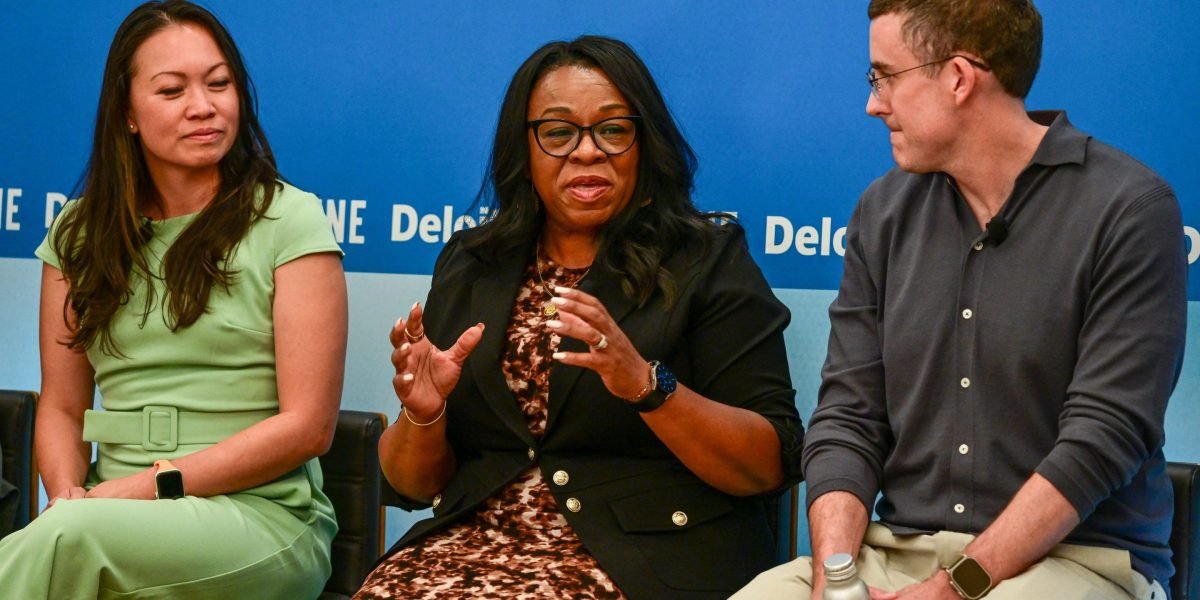Business
Alibaba shares soar most since 2022 after making headway in AI

[HONG KONG] Alibaba Group Holding’s stock leapt more than 18 per cent after reporting a surge in revenue from artificial intelligence (AI), underscoring the steady progress it’s making against rivals in a post-DeepSeek Chinese development frenzy.
China’s e-commerce leader posted a triple-digit percentage gain in AI-related product revenue as well as a better-than-anticipated 26 per cent jump in sales from the cloud division, the business most closely tied to the AI boom.
That helped assuage investors nervous about the fallout from a worsening battle with Meituan and JD.com in Internet commerce. Its shares gained their most intraday since November 2022 in Hong Kong, after investors looked past a disappointing 2 per cent rise in revenue and a surprise decline in operating income. Alibaba’s rally also helped energise the broader AI sphere: Ernie developer Baidu gained as much as 5.8 per cent, while Tencent Holdings climbed.
“Alibaba’s earnings underscore a bifurcation within China tech: AI is delivering scalable growth, while traditional consumer-facing segments remain mired in destructive price competition,” said Charu Chanana, chief investment strategist at Saxo Markets.
“The triple-digit surge in AI revenue and robust cloud sales show Alibaba is repositioning for longer-term relevance in the tech stack, not just retail dominance,” she added.
Alibaba’s progress in AI, where it is considered among the frontrunners in Chinese AI development, helped gloss over concerns about an intense price war with JD and Meituan in the giant food delivery sector.
BT in your inbox
Start and end each day with the latest news stories and analyses delivered straight to your inbox.
That three-way battle has dealt more damage than anticipated to some of the country’s e-commerce leaders: JD’s profit halved in the quarter while Meituan warned of major losses, triggering a US$27 billion sell-off of the three companies’ shares last week.
The AI element helps explain why Alibaba’s stock has easily outpaced its more commerce-reliant rivals this year. Alibaba has also leveraged the growth of an international arm that encompasses some of the world’s most-recognised online shopping platforms from Lazada to AliExpress.
It has “China’s best AI enabler thesis”, Morgan Stanley analysts, including Gary Yu, wrote in a research note. That’s as losses from meal delivery and instant commerce peak this quarter, they said.
Investors are now focused on whether Alibaba will pursue that margin-eroding competition, at a time it’s declared record amounts of spending towards developing AI services and computing.
On Friday, commerce chief Jiang Fan argued that investments in quick commerce, food delivery and instant shopping had already driven 20 per cent growth in users on its main Taobao marketplace. The fledgling division has, in four months, grown to the point that it can begin to achieve economies of scale, he added.
Alibaba is simultaneously making substantial investments in the AI field, developing large language models to avoid falling behind in a critical technological race.
The company views AI as essential to its future, whether in terms of providing cloud computing, powering its core business or coming up with services to challenge OpenAI and DeepSeek. CEO Eddie Wu went as far as saying in February that artificial general intelligence, or AGI, is now the company’s primary objective.
Just last week, Alibaba updated its own open-source video generating model, part of a string of recent upgrades that span the gamut from agentic AI services to chatbots.
It remains to be seen if Alibaba can turn AI into a money-spinner in an increasingly competitive field. From Baidu to Tencent, Chinese firms are enhancing and releasing AI models at a frenetic pace, increasing the pressure on Alibaba to deliver breakthroughs.
“Alibaba’s breakout reinforces a broader theme in Asia: while global tech remains preoccupied with geopolitics and valuations, parts of China tech are quietly reaccelerating-driven not by hype, but by real revenue growth in AI and cloud,” Chanana said. “This isn’t a broad-based rotation yet-but the divergence is real.” BLOOMBERG
Business
Robinhood CEO Says AI Won’t Fully Take Over Trading

AI isn’t ready to take over all the human aspects of trading, said Robinhood’s CEO.
In an interview with Bloomberg Wealth released on Wednesday, Vlad Tenev reiterated his view that people don’t always trade to make money and that there will always be a human aspect to business.
“Most of the time you’re not doing it just because you want to make money,” he said. “You also love trading and you’re you’re extremely passionate about it.”
He added: “I don’t think there’s going to be a future where AI just does all of your thinking, all of your financial planning, all the strategizing for you.”
Tenev, who cofounded the brokerage platform in 2013, said that AI could be a bigger platform shift than mobile and cloud technologies. He said that while every company will quickly become an AI company, AI won’t completely take over trading.
“It’ll be a helpful assistant to a trader and also to your broader financial life,” he said. “But I think the humans will ultimately be calling the shots.”
Tenev made similar remarks about how investors “legitimately enjoy trading” in an August interview with Axios.
On Tuesday, Robinhood announced it was building a social media platform where users can post their trades and track what other investors, including politicians, are buying or selling.
Other CEOs are also wary of pronouncing AI the future of trading.
Ken Griffin, the founder and CEO of Citadel, said he doesn’t think AI will revolutionize the investment business.
“Do we use it in our investment business? A little bit, a little bit. I can’t say it’s been game-changing,” Griffin said in a May interview with Stanford Graduate School of Business.
“It saves some time. It’s a productivity enhancement tool. It’s nice, I don’t think it’s going to revolutionize most of what we do in finance,” Griffin added.
On the topic of AI and trading, Goldman Sachs CEO David Solomon has said that AI has been a big boost to productivity in the investing business.
In an interview with CNBC last year, he said that 40 years ago, when he started the banking business, it took six hours to compare two stocks. Now, it takes an instant, he said.
The firm has already launched ventures that could change how Wall Street makes deals. Louisa AI, a startup founded within the firm six years ago, helps bankers and investors analyze millions of articles and employees’ knowledge to identify deals.
Business
AI Breakthrough Promises More Consistent Results—A Win for Small Businesses – Times Square Chronicles

AI Breakthrough Promises More Consistent Results—A Win for Small Businesses Times Square Chronicles
Source link
Business
Aha moments, the ‘first ten hours’, and other pro tips from business leaders building AI-ready workforces

As businesses face pressure to bring new AI tools on board, they have the dual challenge of effectively incorporating the technology into their operations and of helping their workforce make the best use of the technology.
Longstanding methods for assessing the skills and performance of an employee, as well as hiring practices, are being upended and re-imagined, according to business leaders who spoke at the Fortune Brainstorm Tech conference on Tuesday in Park City, Utah.
Technical skills, contrary to what you might think, are not paramount in the age of AI. In fact, for many employers, technical skills are becoming less important.
“For the first time this summer on our platform we saw a shift,” said Hayden Brown, CEO of Upwork, an online jobs marketplace for freelancers. In the past, when Upwork asked employers on its platform about the most important skills they were hiring for, the answer invariably involved deep expertise in certain technical areas, Brown said. “For the first time this summer, it’s now soft skills. It’s human skills; it’s things like problem solving, judgement, creativity, taste.”
Jim Rowan, the head of AI at consulting firm Deloitte, which sponsored the Brainstorm discussion, said an employee’s “fluency” should not be an end goal in itself. More important is intellectual curiosity around new tools and technology.
And that’s something that needs to start at the top.
“We’ve done a lot of work with executive teams to make sure the top levels of the organization and the boards are actually familiar with AI,” said Rowan. “That helps because then they can communicate better with their teams and see what they’re doing.”
For Toni Vanwinkle, VP of Digital Employee Experience at Adobe, it’s critical for employees at all levels of an organization to have an “aha moment” with AI technology. And the best way to bring that about is for each employee to get their “first ten hours” in.
“Go play with it,” Vanwinkle says. “Sort your email box, take the notes in your meeting, create a marketing campaign, whatever it is that you do.” Through that initial process of personal exploration, you start to understand the potential of the technology, she says.
The next step, Vanwinkle says, is collaboration, discussions, and experimentation among colleagues within the same departments or functionalities.
“This whole spirit of experiment, learn fast. That twitch muscle can turn into something of value when people talk openly,” Vanwinkle says.
The importance of embracing experimentation, and fostering it as a value within the organization, was echoed by Indeed chief information officer Anthony Moisant.
“I think about the pilots we run, most of them fail. And I’m not embarrassed at all to say that,” Moisant says. It all comes down to what a particular organization is optimizing for, and in the case of Indeed, Moisant says, “what we go for is fast twitch muscle. Can we move faster?”
By encouraging more low stakes experiments with AI, companies can gain valuable insights and experience that employees can leverage quickly when it counts. “The only way to move faster is to take a few bets early on, without real long term strategic ROI,” says Moisant.
Workday Vice President of AI Kathy Pham emphasizes that with new tools like AI, getting a full picture of an employee’s value and performance may take a bit longer than some people are used to. “Part of the measurement is better understanding what the return is and over what period of time,” she said.
-

 Business2 weeks ago
Business2 weeks agoThe Guardian view on Trump and the Fed: independence is no substitute for accountability | Editorial
-
Tools & Platforms4 weeks ago
Building Trust in Military AI Starts with Opening the Black Box – War on the Rocks
-

 Ethics & Policy2 months ago
Ethics & Policy2 months agoSDAIA Supports Saudi Arabia’s Leadership in Shaping Global AI Ethics, Policy, and Research – وكالة الأنباء السعودية
-

 Events & Conferences4 months ago
Events & Conferences4 months agoJourney to 1000 models: Scaling Instagram’s recommendation system
-

 Jobs & Careers2 months ago
Jobs & Careers2 months agoMumbai-based Perplexity Alternative Has 60k+ Users Without Funding
-

 Education2 months ago
Education2 months agoVEX Robotics launches AI-powered classroom robotics system
-

 Podcasts & Talks2 months ago
Podcasts & Talks2 months agoHappy 4th of July! 🎆 Made with Veo 3 in Gemini
-

 Education2 months ago
Education2 months agoMacron says UK and France have duty to tackle illegal migration ‘with humanity, solidarity and firmness’ – UK politics live | Politics
-

 Funding & Business2 months ago
Funding & Business2 months agoKayak and Expedia race to build AI travel agents that turn social posts into itineraries
-

 Podcasts & Talks2 months ago
Podcasts & Talks2 months agoOpenAI 🤝 @teamganassi


